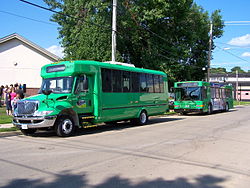Encyclopedia Dubuque
"Encyclopedia Dubuque is the online authority for all things Dubuque, written by the people who know the city best.”
Marshall Cohen—researcher and producer, CNN
Affiliated with the Local History Network of the State Historical Society of Iowa, and the Iowa Museum Association.
JULE (THE): Difference between revisions
No edit summary |
No edit summary |
||
| Line 1: | Line 1: | ||
JULE (THE). The Jule, formerly known as KeyLine Transit, is the operator of mass transit within the City of Dubuque, Iowa. The reorganization of the public transit system was one of the goals of the city council to make Dubuque more sustainable. The bus fleet was outdated, oversized, and did not make it convenient for most citizens to ride. (1) | [[File:jule1.png|250px|thumb|left|Jule logo]] | ||
[[File:jule2.JPG|250px|thumb|left|]]JULE (THE). The Jule, formerly known as KeyLine Transit, is the operator of mass transit within the City of Dubuque, Iowa. The reorganization of the public transit system was one of the goals of the city council to make Dubuque more sustainable. The bus fleet was outdated, oversized, and did not make it convenient for most citizens to ride. (1) | |||
The City and East Central Intergovernmental Association secured $3.8 million in funding from the U. S. Department of Transportation to replace the bus fleet. During the time the fleet was being replaced, routes and ridership trends were studied. Increased fuel efficiency and decreased operational costs were made high priorities. The new buses which came to Dubuque in 2011 were diesel powered. It was anticipated they would save the City $250,000 annually in maintenance costs. They were also better sized so that nearly empty buses were not traveling the [[STREETS]]. (2) | The City and East Central Intergovernmental Association secured $3.8 million in funding from the U. S. Department of Transportation to replace the bus fleet. During the time the fleet was being replaced, routes and ridership trends were studied. Increased fuel efficiency and decreased operational costs were made high priorities. The new buses which came to Dubuque in 2011 were diesel powered. It was anticipated they would save the City $250,000 annually in maintenance costs. They were also better sized so that nearly empty buses were not traveling the [[STREETS]]. (2) | ||
Revision as of 15:10, 12 September 2014
JULE (THE). The Jule, formerly known as KeyLine Transit, is the operator of mass transit within the City of Dubuque, Iowa. The reorganization of the public transit system was one of the goals of the city council to make Dubuque more sustainable. The bus fleet was outdated, oversized, and did not make it convenient for most citizens to ride. (1)
The City and East Central Intergovernmental Association secured $3.8 million in funding from the U. S. Department of Transportation to replace the bus fleet. During the time the fleet was being replaced, routes and ridership trends were studied. Increased fuel efficiency and decreased operational costs were made high priorities. The new buses which came to Dubuque in 2011 were diesel powered. It was anticipated they would save the City $250,000 annually in maintenance costs. They were also better sized so that nearly empty buses were not traveling the STREETS. (2)
It was important to choose buses that were environmentally "clean." The new buses were expected to save .67 tons of particulate matter (dust and soot) annually and 514 tons of carbon monoxide emissions. This affected not only the environment locally but future economic development. The Environmental Protection Agency monitors air quality. Cities with high levels of pollutants are classified as "Nonattainment." This declaration limits new private sector and transportation development. (3)
Ridership of city buses was up 8% in 2012. (4)
The Jule offers transit bus routes throughout the city, trolley-replica transportation in Downtown Dubuque and the Port of Dubuque, and on-demand paratransit "MiniBus" service citywide. The transit system is currently in the early stages of a rebranding and the majority of the buses still carry the old Keyline markings. The transit system and city are now both named after Julien DUBUQUE.
The Jule is a municipal department of the City of Dubuque that began service following the city's takeover of the INTERSTATE POWER COMPANY bus lines in the early 1970s. The Jule is operated by The East Central Intergovernmental Association (ECIA), and is supervised by a director who reports to the Dubuque City Manager, Michael Van Milligen, and acts on policy as given by the Dubuque City Council, on advice of the Dubuque Transit Trustee Board.
The Jule operates 4 bus lines: Gray, Green, Red and the Medical Loop which replaces the orange line. All lines except the Orange run in a general pattern from downtown in the east to Kennedy Mall in the west, and then back downtown. These lines stop at all 3 major transfer stations: Downtown, Midtown, and the West Side. The Medical Loop runs from downtown and then north and south, stopping at no other transfer stations. The Jule operates Monday-Saturday citywide, with the earliest buses out at 6:15 A.M., and the latest out at 5:55 P.M.[2] During the summer months, The Jule operates a trolley shuttle between the Downtown Transfer Station (West 9th & Main Streets) and the Port of Dubuque, with stops at the major tourist attractions in the area, including: DIAMOND JO CASINO, Grand Harbor Resort & Waterpark, Grand River Center, NATIONAL MISSISSIPPI RIVER MUSEUM AND AQUARIUM.
In addition to fixed-route buses, The Jule provides on-demand paratransit service through its "MiniBuses." These shuttles generally transport elderly & handicapped passengers from their homes to medical clinics, and other specific destinations. The service is available by appointment only.
___
Source
1. Burbach, Cori. "Investing in Public Transit: A Triple Bottom Line," Julien's Journal, April 2012, p. 48
2. Ibid.
3. Ibid.
4. Ibid.
"Jule" Wikipedia. Online: http://en.wikipedia.org/wiki/The_Jule



